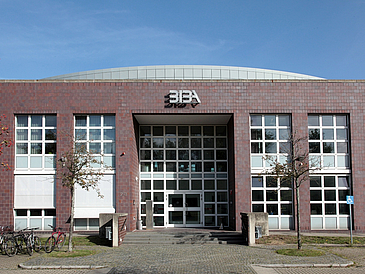It ranks among the most important names in the State of Bremen: the Bremen Institute of Industrial Technology and Applied Work Science – German abbreviation: BIBA. It was around this time 30 years ago that the University of Bremen’s very first affiliated institute was founded. BIBA owes its existence to a small group of visionaries drawn from the private economy, politics, and science. They implemented their idea in 1981 by founding the Bremen Institute of Industrial Technology and Applied Work Science, as it was then known, and merging it with a collaborative research project entitled ”Ship of the Future”. The Institute’s first director, Professor Holger Luczak, officially took up his appointment on 1st July 1981.
Initially spread over different parts of the campus, the BIBA relocated to its own building in October 1992. While still under construction, the building got the nickname “the half pie”. In those days, the Institute already boasted 130 employees, and it has gone on to expand further since then. Several renowned production engineers have left their mark on the Institute over the years and made their contribution to its great success.
World View with Tradition
Following in the footsteps of its visionary trailblazers from 30 years ago, the BIBA researchers have developed an uncanny instinct for trends, topics, and new requirements. Today, BIBA’s strength lies in its interdisciplinary and holistic approach to ever-more complex production systems and logistics networks. It places a special emphasis on providing a sound practice-based education.
The internationally acclaimed Institute not only makes the headlines due to its frequently somewhat unconventional courses. Products developed by students, like the one-cup dishwasher or the motorized surf board, are always good for causing a stir.
Since 2007, the meanwhile renamed “BIBA – Institute of Industrial Technology and Applied Work Science (Institut für Produktion und Logistik GmbH)” has been led by Professor Bernd Scholz-Reiter. Today the Institute participates in no less than three Collaborative Research Centers funded by the German Research Foundation (DFG) and provides work to some 200 people.
More information under: biba.uni-bremen.de

